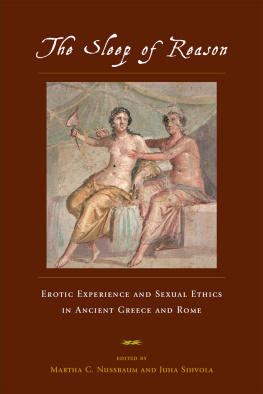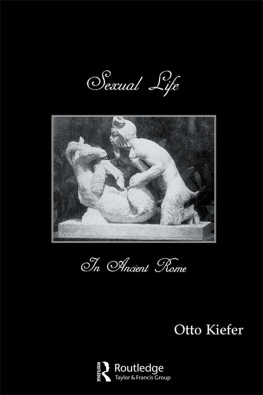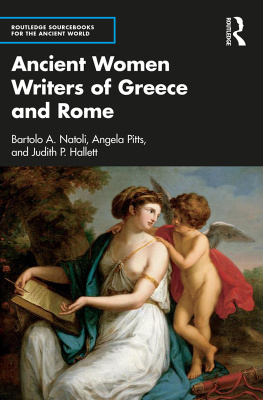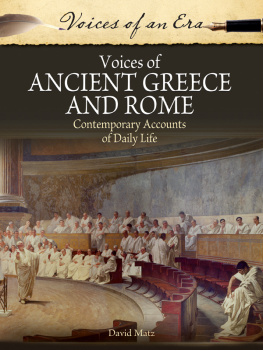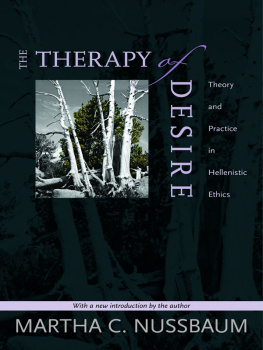Martha C. Nussbaum - The Sleep of Reason: Erotic Experience and Sexual Ethics in Ancient Greece and Rome
Here you can read online Martha C. Nussbaum - The Sleep of Reason: Erotic Experience and Sexual Ethics in Ancient Greece and Rome full text of the book (entire story) in english for free. Download pdf and epub, get meaning, cover and reviews about this ebook. publisher: University of Chicago Press, genre: Science. Description of the work, (preface) as well as reviews are available. Best literature library LitArk.com created for fans of good reading and offers a wide selection of genres:
Romance novel
Science fiction
Adventure
Detective
Science
History
Home and family
Prose
Art
Politics
Computer
Non-fiction
Religion
Business
Children
Humor
Choose a favorite category and find really read worthwhile books. Enjoy immersion in the world of imagination, feel the emotions of the characters or learn something new for yourself, make an fascinating discovery.
- Book:The Sleep of Reason: Erotic Experience and Sexual Ethics in Ancient Greece and Rome
- Author:
- Publisher:University of Chicago Press
- Genre:
- Rating:4 / 5
- Favourites:Add to favourites
- Your mark:
- 80
- 1
- 2
- 3
- 4
- 5
The Sleep of Reason: Erotic Experience and Sexual Ethics in Ancient Greece and Rome: summary, description and annotation
We offer to read an annotation, description, summary or preface (depends on what the author of the book "The Sleep of Reason: Erotic Experience and Sexual Ethics in Ancient Greece and Rome" wrote himself). If you haven't found the necessary information about the book — write in the comments, we will try to find it.
Martha C. Nussbaum: author's other books
Who wrote The Sleep of Reason: Erotic Experience and Sexual Ethics in Ancient Greece and Rome? Find out the surname, the name of the author of the book and a list of all author's works by series.
The Sleep of Reason: Erotic Experience and Sexual Ethics in Ancient Greece and Rome — read online for free the complete book (whole text) full work
Below is the text of the book, divided by pages. System saving the place of the last page read, allows you to conveniently read the book "The Sleep of Reason: Erotic Experience and Sexual Ethics in Ancient Greece and Rome" online for free, without having to search again every time where you left off. Put a bookmark, and you can go to the page where you finished reading at any time.
Font size:
Interval:
Bookmark:
The Sleep of Reason
EROTIC EXPERIENCE AND SEXUAL ETHICS IN ANCIENT GREECE AND ROME
Edited by
MARTHA C. NUSSBAUM
AND JUHA SIHVOLA
THE UNIVERSITY OF CHICAGO PRESS
CHICAGO AND LONDON
Martha C. Nussbaum is the Ernst Freund Distinguished Service Professor of Law and Ethics at the University of Chicago. She is the author, most recently, of Women and Human Development: The Capabilities Approach and Upheavals of Thought: The Intelligence of Emotions. Juha Sihvola is professor of history at the University of Jyvskyl, Finland. He is the author of Decay, Progress, and the Good Life? Hesiod and Protagoras on the Development of Culture and the editor of Ancient Scepticism and the Scepticist Tradition.
The University of Chicago Press, Chicago 60637
The University of Chicago Press, Ltd., London
2002 by The University of Chicago
All rights reserved. Published 2002
Printed in the United States of America
11 10 09 08 07 06 05 04 03 02 1 2 3 4 5
ISBN: 0-226-60914-6 (cloth)
ISBN: 0-226-60915-4 (paper)
ISBN: 978-0-226-92331-4 (e-book)
Library of Congress Cataloging-in-Publication Data
The sleep of reason : erotic experience and sexual ethics in ancient Greece and Rome / edited by Martha C. Nussbaum and Juha Sihvola.
p. cm.
Includes bibliographical references and index.
ISBN 0-226-60914-6 (cloth : alk. paper)ISBN 0-226-60915-4 (pbk. : alk. paper)
1. Sex customsGreeceHistoryCongresses. 2. Sex customsRomeCongresses. 3. Sexual ethicsGreeceHistoryCongresses. 4. Sexual ethicsRomeCongresses. 5. GreeceCivilizationTo 146 B.C.Congresses. 6. RomeCivilizationCongresses. I. Nussbaum, Martha Craven, 1947 II. Sihvola, Juha.
HQ13 .S54 2002
306.7'0938dc21 2001052755
 The paper used in this publication meets the minimum requirements of the American National Standard for Information SciencesPermanence of Paper for Printed Library Materials, ANSI Z39.48-1992.
The paper used in this publication meets the minimum requirements of the American National Standard for Information SciencesPermanence of Paper for Printed Library Materials, ANSI Z39.48-1992.
This book is printed on acid-free paper.
Acknowledgments
This volume derives from a conference held at the Finnish Institute at Rome (Institutum Romanum Finlandiae) in 1997, itself part of a series of conferences held beginning in 1991, aimed at bringing Finnish scholars in ancient Greek and Roman philosophy into closer contact with scholars from other parts of the world. (All the other conferences have been held at the University of Helsinki.) A conference in 1991 on ancient Greek rhetoric and its philosophical treatment inaugurated the series. It was followed in 1994 by a conference on Hellenistic philosophy of mind, now published as The Emotions in Hellenistic Philosophy, edited by Juha Sihvola and Troels Engberg-Pedersen (The Netherlands: Kluwer, 1998). A conference in 1996 on ancient Greek skepticism is now published as Ancient Scepticism and the Sceptical Tradition, edited by Juha Sihvola, in the series Acta Philosophica Fennica (Helsinki: Philosophical Society of Finland, 2000). A conference in 2001, at the University of Jyvskyl, addressed the relationship between philosophical theory and political practice. All of the conferences were supported in part by funding from the Academy of Finland, to which we express warm thanks. The Finnish Cultural Foundation also supported our efforts, and we also express warm thanks to them, and to Paavo Hohti.
The conference in Rome was made possible by the gracious hospitality of Paivi Setl, then director of the Finnish Institute at Rome. We are enormously grateful to her for her enthusiasm for our project, her scholarly participation, and all the arrangements she made to receive an unusually large and diverse group of scholars on the premises of the institute. The institutes beautiful site on the Janiculum, commanding an extraordinary view of the entire city, was an ideal setting for discussion and collegiality. The nearby American Academy at Rome provided lodging for some of the conference participants.
The editors wish to express their warmest thanks to Doug Mitchell, the editor who shaped the volume and encouraged us at every stage; to Neil A. Coffee for his meticulous and judicious reading of the proofs; and to Rick A. Furtak for his excellent work preparing the indices.
Introduction
Martha C. Nussbaum and Juha Sihvola
What desires do you mean?
Those that are awakened in sleep, when the rest of the soulthe rational, gentle, and ruling partslumbers. Then the beastly and savage part, full of food and drink, casts off sleep and seeks to find a way to gratify itself. You know that there is nothing it wont dare to do at such a time, free of all control by shame or reason. It doesnt shrink from trying to have sex with a mother, as it supposes, or with anyone else at all, whether man, god, or beast. It will commit any foul murder, and there is no food it refuses to eat. In a word, it omits no act of folly or shamelessness.
Thats completely true.
On the other hand, I suppose that someone who is healthy and moderate with himself goes to sleep only after having done the following: First, he rouses his rational part and feasts it on fine arguments and speculations; second, he neither starves nor feasts his appetites, so that they will slumber and not disturb his best part with either their pleasure or their pain, but theyll leave it alone, pure and by itself, to look for somethingit knows not whatand to try to perceive it, whether it is past, present, or future.
Plato, Republic 571CD
This domain of phantasms is no longer the night, the sleep of reason, or the uncertain void that stands before desire, but, on the contrary, wakefulness, untiring attention, zealous erudition, and constant vigilance.
Michel Foucault, Fantasia of the Library
Sex eludes rational control, and yet, for that very reason, it is constantly reasoned about. And so it was, intensely, in ancient Greece and Rome. Together with ubiquitous allusion to the ungovernable properties of sexual desire and erotic love went an outpouring of reasoned ethical argument, and often philosophical argument, about the management of desire. Most ancient Greeks and Romans would have agreed, to at least some extent, with Socrates and Glaucon: the appetites are very difficult to manage by reason, and the sexual appetite perhaps most difficult of all. And yet they did not give up, any more than Socrates does. Just as Platos Socrates proposes an elaborate program of philosophical discipline to control the erotic content of dreams, so in countless ways the Greeks and Romans reasoned ethically about sex, calling philosophy to their aid. From the time of Socrates onward, philosophy of one sort or another was ubiquitous in discussions of sexual ethics, and the philosophers, for their part, were less detached academicians than immersed cultural participants, who took their problems from the culture and hoped to shape the culture in their turn. They proposed arguments about sexual problems, and they also, as does Socrates, proposed practices of self-management that went with the arguments.
Michel Foucault, in the passage we have taken as our second epigraph, speaks of the modern period when he speaks of a constant discourse about sex that exercises constant vigilance and creates a proliferation of categories, shaping not only discourse, but also action and even desire. But as his important writings on Greek and Roman antiquity show, he also believed that this description applied to the Greeks. The classification of pleasures, the obsessive watching over the self, the participation of philosophy in the attempt to turn lawless dreams into good dreams: Foucault was right to see in all of this an enduring preoccupation of the ancient Greek philosophical tradition and of its Roman continuations.
Next pageFont size:
Interval:
Bookmark:
Similar books «The Sleep of Reason: Erotic Experience and Sexual Ethics in Ancient Greece and Rome»
Look at similar books to The Sleep of Reason: Erotic Experience and Sexual Ethics in Ancient Greece and Rome. We have selected literature similar in name and meaning in the hope of providing readers with more options to find new, interesting, not yet read works.
Discussion, reviews of the book The Sleep of Reason: Erotic Experience and Sexual Ethics in Ancient Greece and Rome and just readers' own opinions. Leave your comments, write what you think about the work, its meaning or the main characters. Specify what exactly you liked and what you didn't like, and why you think so.

